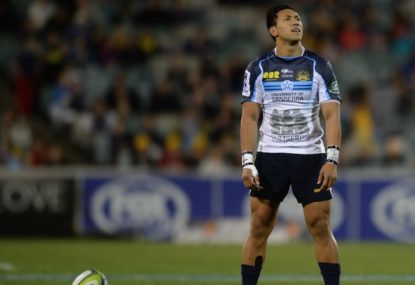The ‘commentator’s curse’ is usually thought to be a commentator talking up or complimenting a player, which then immediately causes them to make a mistake.
This however, is a minor curse compared to the real modern day commentator’s curse which has more to do with pronunciation.
A few people will be aware that the word is actually pronounced, and spelt, pronunciation, not pronounciation, but if the Australian rugby commentators were to have a debate about it, they would almost certainly decide in favour of the latter.
This is pretty much what happened when Rod Kafer and Phil Kearns debated whether the middle of a player’s torso was called a midriff or a midrift. They eventually decided, wrongly, that it was midrift and have used this ever since.
To me a midrift could be another name for halftime, or Sonny-Bill Williams walking out on his Bulldogs contract mid term, but it has nothing to do with anatomy. That’s midriff.
It is unfortunate that a round of the World Sevens series is held in Las Vegas, as no Australian commentator comprehends that while there is a major city called Los Angeles, the casino city is called Las Vegas, pronounced Lahs Vegas. The US, British and New Zealand commentators seem to have worked this out; Los Vegas seems to be a purely Australian curse.
Fortunately Sevens had not yet made it onto the Olympic program in Beijing, or we would have been cursed with rugby commentators joining the other Australian accents intoning Bayjing with a hard j as in jingle, rather than the more correct Bayshing.
Commentators are clearly not aware that you cannot ‘step foot’ on anything. You set your foot on something, therefore you ‘set foot’ on the field.
It would also be nice if sports commentators could get sports based sayings correct. We often hear that someone did something “off his own back”. This is actually based on cricket where someone scores runs “off his own bat”.
It’s perhaps understandable that commentators are not familiar with farming sayings and therefore we hear that a team well behind on the scoreboard “has a long road to hoe” to get back in contention. It’s pretty hard to hoe a road and I’m not sure why you’d want to; the saying comes from cotton farming where you have a long row (of cotton) to hoe.
Rod Kafer again, managed to come up with “to all intensive purposes” at the weekend, when he should have been saying “to all intents and purposes”.
There are a few rugby specific ones too.
We regularly hear that someone has “cleared his lines”, generally with a kick to touch. This is very bemusing. I could understand it if he cleared “the line”, presumably getting the ball clear of the goal-line, but how can one clear several lines? The deadball or 22 metre lines don’t need the ball cleared away, the only line in danger is the goal-line, therefore, commentators should talk about clearing only one line.
Another one that comes up from time to time, is “lucked out”. This is usually meant as the ball bounced his way and therefore he was lucky. But when your luck is out, you are actually unlucky. When the ball bounces into your arms, you have actually “lucked in”.
Similarly, saying “I could care less”, actually means you care a lot. The proper saying is “I couldn’t care less”. This actually means that your care factor has bottomed out.
Because of the huge Pacific Island influence on rugby, there are a vast number of tongue twisting names out there. Most of the islander players accept the fate of their mangled names, and it is very seldom that one specifies how his name should be pronounced.
Digby Ioane was one example who eventually decided that enough was enough and requested Yo-ah-nee rather than I-oh-nee.
Christian Lealiifano is a classic example. In Australia his name is pronounced, Lee-lee-afano. New Zealand commentators pronounce it Lee-ar-lee-afano, and in South Africa it becomes something so weird that I had no idea who they were actually referring to.
I’m not sure which version is correct (although I’m pretty sure it’s not the South African one) but someone is clearly getting it wrong. How difficult would it be for commentators to ask him how he wants his name pronounced, or ask the team manager to provide the phonetic pronunciations for all tricky names in the team?
This should also be done for Afrikaner or other slightly exotic names, when the South African teams tour down under. I’ve still no idea how Damian de Allende is pronounced as I’ve heard versions ranging from Dalland to Deelendee. Depending on who’s talking it could be Skalk Burger or Shalk Burger.
Commentators have a responsibility to their audience to get it right as often they provide the only version of someone’s name that we hear.
Most of these commentators once trained exhaustively to become top level rugby players and worked extremely hard to improve their standards of play. But now that they have become commentators, where they require a good command of language to be able to communicate with the viewers, they seem to do no training whatsoever to improve a vital part of their game.
It’s time we demanded better language skills from those who talk for a living.





























































































